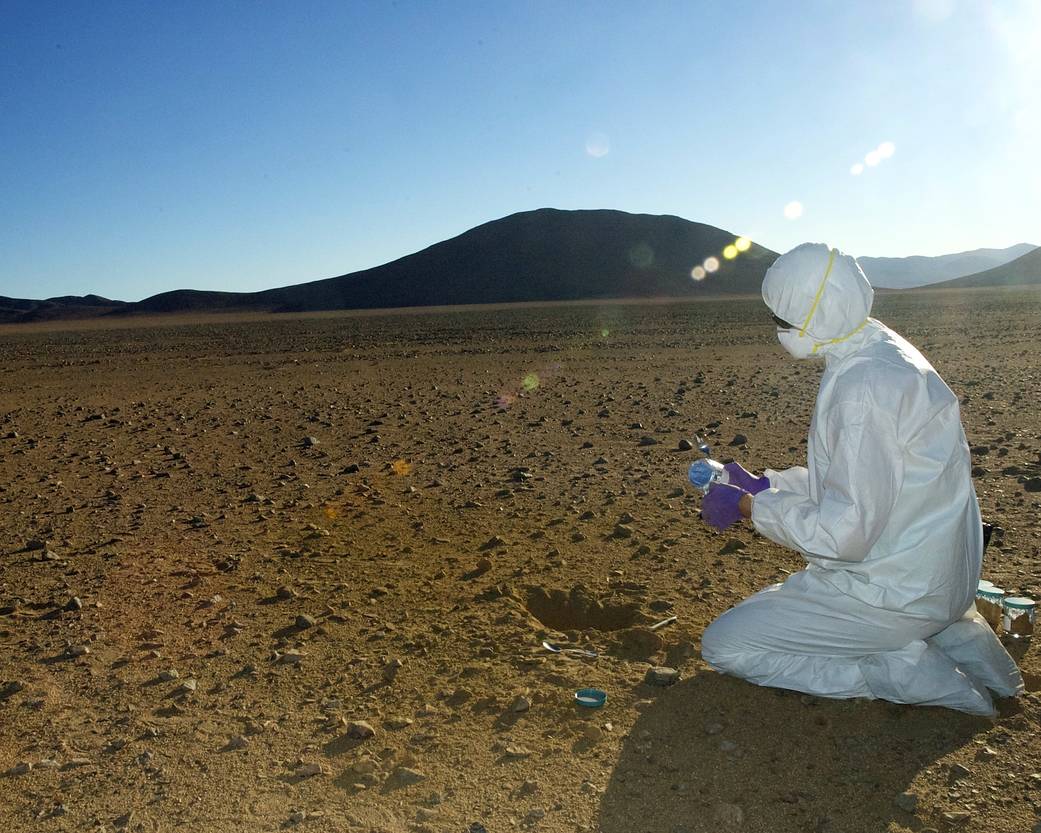-
Fossil Preservation in One of the Driest Places on Earth
May 13, 2017 / Posted by: Miki Huynh
NASA scientist, Mary Beth Wilhelm, collects soil samples of preserved ancient microorganisms in the Atacama Desert.In the above photo, NASA scientist Mary Beth Wilhelm, wearing a cleanroom suit, kneels as she collects soil samples containing microorganisms from Chile’s Atacama Desert, one of the driest places on the planet. She is investigating the preservation of ancient microorganisms on Earth, and what that might mean for future visits to Mars.
“My research shows that the molecules which made up microbes that lived long ago remain well preserved under extremely dry, Mars-like conditions in the Atacama Desert here on Earth,” said Wilhelm, a researcher at NASA’s Ames Research Center in California’s Silicon Valley, and a member of the NASA Astrobiology Institute (NAI) team at SETI.
Wilhelm recently published a paper that is among the first to characterize the high-quality preservation of molecular fossils in extremely dry deserts, and has implications for what we might expect to find preserved on Mars, which has been a desert for billions of years.
Other project collaborators included Niki Parenteau, Linda Jahnke and Alfonso Davila from Ames; Jennifer Eigenbrode from NASA’s Goddard Space Flight Center; Roger Summons, Xiao-lei Lie and Shane O’Reilly from the Massachusetts Institute of Technology (MIT), Cambridge, Massachusetts; Amy Williams from Towson University (Baltimore, Maryland); Brian Stamos from the University of Texas-Arlington; and James Wray from the Georgia Institute of Technology (Atlanta, Georgia).
The paper is available in the journal of Organic Geochemistry. Research was supported in part by the National Science Foundation, the NAI, a NASA Astrobiology Early Career Collaboration Award, and NASA Exobiology.
___
Related story: NASA Tests Life-Detection Drill in the Mars-Like Atacama Desert
Source: [NASA]
- The NASA Astrobiology Institute Concludes Its 20-year Tenure
- Global Geomorphologic Map of Titan
- Molecular Cousins Discovered on Titan
- Interdisciplinary Consortia for Astrobiology Research (ICAR)
- The NASA Astrobiology Science Forum Talks Now on YouTube
- The NASA Astrobiology Science Forum: The Origin, Evolution, Distribution and Future of Astrobiology
- Alternative Earths
- Drilling for Rock-Powered Life
- Imagining a Living Universe
- Workshops Without Walls: Astrovirology